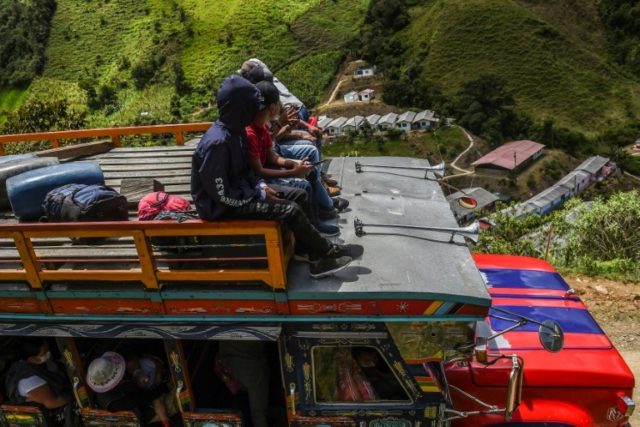Ituango (Colombia) (AFP) – Yerlis Ballesteros has been here before, fleeing for her life. The first time she held her mother’s hand, but this time she is fleeing with her two children, leaving the mountainous region where she once fought as a guerrilla before opting for a life of peace.
The violence that accompanies drug trafficking in Ituango, in the Colombian northwestern department of Antioquia, has ruined her plans and those of fellow former Revolutionary Armed Forces of Colombia (FARC) rebel fighters to settle into a peaceful life.
On Wednesday, 93 ex-rebels and their families began a voyage of no return, leaving Ituango determined to avoid the fate of 12 members of their group who were murdered over the last four years.
“It’s the straw that’s broken the camel’s back. We can’t resist any more as they keep killing comrades,” said Ballesteros, 32.
FARC rebels fought government forces and right-wing paramilitaries in the region that includes Ituango until a historic peace accord was signed in 2016 that ended half a century of conflict.
Their caravan of vehicles set off under government escort for Mutata, a town located hundreds of kilometers away also in the department of Antioquia.
It’s the first time since the peace agreement was signed that ex-guerrillas have been forced to move for their safety.
They bid farewell to their neighbors, loaded up their animals and belongings in trucks, and hit the road. There were no hugs or kisses — the novel coronavirus pandemic put paid to that.
It was a sad and destabilizing journey that lasted almost 24 hours to a strange land where former comrades gave them shelter.
‘We lost everything’
Ballesteros was very young the first time she endured forced displacement. She has little memory of it, except running for her life with her mother and two siblings.
As a teenager, she joined the FARC and fought for 12 years in a conflict that forced eight million people from their homes since 1985, according to government figures.
Now history is repeating itself for the ex-guerrillas of Ituango.
“We lost absolutely everything,” said John Taborda, who was five years old when paramilitaries forced his family to flee.
He fought with the FARC and signed the peace deal, but now, at age 27, he says he has to “start from zero” again.
“We trusted in the government’s good faith, that it would stick to the conditions, the mechanisms for protection and security… and it’s a bit frustrating having to accept that it’s not possible,” he said.
At the mercy of former comrades
Since laying down their arms, Ballesteros and around 300 ex-guerrillas built a small commune in Ituango and began to live off farming and livestock.
But the violence continued in the region as another left-wing guerrilla group, the National Liberation Army (ELN), as well as right-wing paramilitaries and drug traffickers vied for ascendancy.
Forces include ex-FARC guerrillas who refused to lay down their arms, as well as groups like the Clan del Golfo and Los Caparrapos — powerful armies fighting over the lucrative illegal mining trade and drug-trafficking routes.
The former rebels leaving Ituango became victims rather than perpetrators.
The Colombian military has struggled to assert government authority over the lawless territory despite the end of the conflict with the FARC.
In January, Cesar Herrera, a former comrade of Ballesteros’s, was murdered in the village where he was completing his process of social and economic reintegration.
For the leftist party of ex-rebels formed as part of the peace process, which also uses the FARC acronym, the peace accord is slowly bleeding to death.
Already 219 ex-guerrillas have been murdered since the accord, and many elements of the deal exist only on paper, according to the party.
‘Failure’
Of the 13,000 men and women that abandoned armed resistance with the peace deal, some 3,000 live in 23 communes like the one abandoned in Ituango.
But in some of those areas, the conflict persists.
“In this piece of land, the peace process failed. We gathered more than 300 ex-combatants and now only seven remain,” said Jesus Arenas, 58, the FARC party’s leader in Ituango.
Those seven decided not to join the group of 93 ex-guerrillas leaving Ituango, or the dozens of others who had earlier fled the commune for their lives.
For Ballesteros and the others, life in Mutata may be tough and uncertain, but they refuse to waver from one commitment: never to pick up arms again.
Ballesteros’s only hope is to not have to “repeat this story” of displacement for a third time.

COMMENTS
Please let us know if you're having issues with commenting.